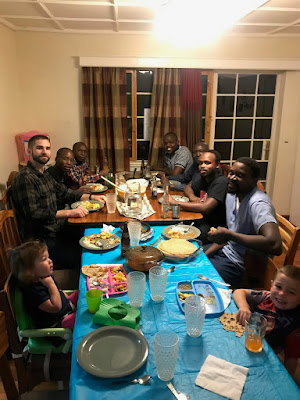"It's ok Daktari. Thank you. I will be ok."
We had maybe ten words in common, but somehow my patient, I'll call him Barnabas, had looked into my eyes and read me like a book.
For three mornings, I had approached Barnabas’ hospital bed with more than a small amount of anxiety. The last two days he had been too delirious to speak, or even wiggle his toes. And today, it seemed he was peering into my soul, seeing all the worry and discouragement there, and responding with hope.
Barnabas had been crushed by a forklift and had a complicated pelvic ring injury. His injury pattern and our limited resources required me to place hardware in his pelvis in ways I had never done before, which carried a risk of nerve injury. In addition, the last patient I performed open pelvis surgery on had developed a postoperative infection that had been difficult to control.
So yes, each day as I approached Barnabas' bed, I anxiously looked at his wound and asked him to wiggle his toes. Praise God, his toes were moving and his wound looked good. And now, as he was still gathering his senses, Barnabas was the one caring for me, telling me it was going to be ok.
And while I was certainly thinking, Thank God!, I was also wondering: How could he know it will be ok? Barnabas had no power to make his pelvis heal or prevent an infection. Indeed, he was in the same room as several patients whose wounds were not healing or who had lost their limbs due to infection. It was obvious that neither I, nor God, was miraculously preventing pain and suffering, even here at a mission hospital. So how could he say it would be ok?
Barnabas could have hope because he was surrounded by a community that cared for him, and he knew a God who was right there with him in the midst of his suffering. So regardless of the outcome, he would be ok.
Through Barnabas and several patients like him, I have been reminded that God is not distant and aloof, unaware or uncaring toward our pain and suffering. Rather, through Jesus, we know a God who entered into humanity and experienced the fullest extent of human suffering and evil. He was homeless, persecuted, tortured, and brutally murdered- and he responded with love, forgiveness, and hope. This same Jesus continues to suffer with all humanity and gives us the strength to carry on with love and hope no matter the circumstances.
So as I enter this New Year, I am thankful and hopeful. Yes, there is pain and suffering - and at times I am overwhelmed by the number of patients we treat, the severity of their injuries, and my own feelings of inadequacy to make any sort of difference. But I’m thankful that Barnabas, probably unbeknownst to him, reminded me that it WILL BE OK. God is with us. I’m thankful for the opportunity to be serving here at Tenwek, and for the many friends and supporters like you that make this possible. I am hopeful that God will work in and through you and me and that Jesus' kingdom of selfless love will continue to grow. And I am ultimately hopeful for that day when, “the home of God is among mortals. He will dwell with them as their God: they will be his peoples… he will wipe away every tear from their eyes. Death will be no more: mourning and crying and pain will be no more…(Rev 21:3,4).”
…..And on a lighter note, here are a few other things the Weston crew is thankful for as we close out 2019:











